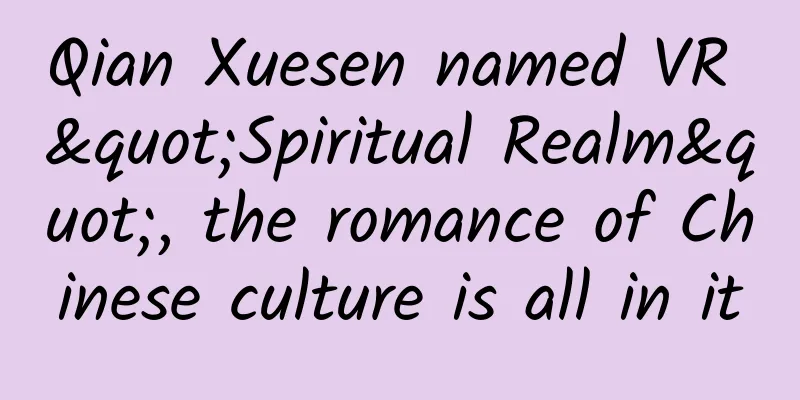Qian Xuesen named VR "Spiritual Realm", the romance of Chinese culture is all in it

|
In April 1996, at the Beijing Military Museum, a long queue of several hundred people formed in front of a special exhibition stand. People were eager to see the "Forbidden City", a display of the ten-year achievements of the national "863 Plan": wearing a special helmet and riding a special bicycle, they could travel back and forth in the virtual Forbidden City, as if they were actually there. This is a description from the book of Wang Jian, the founder of Alibaba Cloud. In 1993, the national "863 Plan" had already established virtual reality technology as a project. A few years later, "virtual reality" also had its humble beginnings, but at that time it seemed to represent the cutting-edge achievements of the future. "Virtual Reality is another revolutionary technology after the computer revolution, which will trigger a series of changes that will shock the world." The person who said this was Qian Xuesen. Thirty years later, Qian Xuesen's manuscripts were "dug out". While people were surprised by his forward-looking thinking, they were also amazed that Qian Xuesen gave Virtual Reality a translation full of "Chinese style" - spiritual realm. Qian Xuesen's Manuscripts|Shanghai Jiaotong University Qian Xuesen Library Website VR and AI in the 1980s In 1990, Qian Xuesen wrote a letter to Wang Chengcheng, then head of the "863 Project" Intelligent Computer Expert Group, and provided two translations for Virtual Reality - "artificial landscape" or "spiritual landscape". Qian Xuesen said he liked the latter because it had a strong Chinese flavor. The origin of this discussion was Qian Xuesen's thinking on artificial intelligence. "Qian Xuesen's attention to VR is an extension of his ideas on artificial intelligence. In the 1980s, Qian Xuesen was very concerned about artificial intelligence issues. When he discovered VR technology, it coincided with his ideas on the integration of man and machine," said Li Yuebai, librarian of the Academic Research Department of the Qian Xuesen Library. Xi'an Jiaotong University Qian Xuesen Library|Zhaoku Hailuo Between the 1980s and 1990s, Qian Xuesen raised the importance of artificial intelligence on many occasions and publicly advocated the implementation and promotion of the national intelligent computer plan. At that time, Japan's development of the "fifth-generation computer" attracted worldwide attention, and Qian Xuesen and Wang Cheng had several discussions: How can China develop intelligent computers? In 1987, a discussion was held at Tsinghua University, where Qian proposed to conduct research on artificial intelligence technology from 11 aspects: artificial intelligence, brain science, cognitive psychology, philosophy, literary poetry and language related to image thinking, scientists' remarks on scientific methods, social thinking, fuzzy mathematics, parallel computing, ancient mathematical logic, system theory and system science. It is still meaningful enough to learn from today. In 1993, another handwritten letter to Wang further showed why Qian thought VR was important. "My interest in spiritual technology and multimedia lies in its ability to greatly expand the perception of the human brain, because it allows people to enter an unprecedented new world." What is this "new world"? It is the combination of man and machine. VR, which is generally recognized today, was proposed by Jaron Lanier, the founder of VPL in the United States in the 1980s. It is a technology that uses computer graphics systems and various interface devices such as reality and control to provide an immersive feeling in a three-dimensional environment generated by a computer and can be interacted with. After it was introduced to China, it was translated into Chinese as "Linjing", "Dianxiang", "Xushi", and some scholars directly translated it as "Virtual Reality". Qian also noticed the translation of "Linjing". In 1998, Qian wrote to the Office of the National Committee for the Examination of Scientific and Technological Terms, saying that "Spiritual Realm" is better than "Linjing" because this realm is virtual, not real. The sense of immersion brought by VR is not really being there, but feeling yourself. So using "Spiritual Realm" is realistic. Qian Xuesen's Manuscripts|Shanghai Jiaotong University Qian Xuesen Library Website Qian Xuesen's Manuscripts|Shanghai Jiaotong University Qian Xuesen Library Website Coincidentally, Jaron Lanier also expressed in his memoir Dawn of the New Everything: Encounters with Realit that “the best enjoyment of VR includes not really being convinced. Like when you go to a magic show.” This “VR pioneer” also emphasized that virtual reality helps people focus on reality, and that the “virtual” serves the “real”. Once, holding a special issue of Scientific American on the development trend of information technology (1991), Qian asked Wang: What is Cyberspace? How is it different from Information Space? Wang recalled that in the following decade, Qian urged him to continue to study the bottlenecks restricting the development of information technology and its development prospects. Wang later concluded that "the essence of informatization is to establish a harmonious relationship between people, machines and the information environment." Qian also proposed the concept of "Great Wisdom" in 1997, and translated it into English as Wisdom in Cyberspace, predicting that informatization would have a positive impact on the development of human wisdom. So in a letter to Wang and others, Qian wrote that the spiritual realm technology that can "greatly expand the perception of the human brain" is another technological revolution after the computer technology revolution. " Qian Xuesen's Manuscripts|Shanghai Jiaotong University Qian Xuesen Library Website Qian Xuesen's Manuscripts|Shanghai Jiaotong University Qian Xuesen Library Website Predicting the future and understanding technology through translation Lanier's team studied many VR technology patents and developed the first widely used head-mounted visual device EyePhone and tactile sensing product: data gloves. The latter was licensed to the toy company Mattel, bringing the VR concept from the laboratory to the public. Although VR technology developed rapidly in the 1980s and 1990s, its application to the public still remained at the issue of constructing three-dimensional images and breaking through the two-dimensional perspective of the human eye. VR|Zhaocool Hailuo Perhaps it does not fit Qian's definition of the term "spiritual realm" - using scientific and technological means to transmit visual, auditory, tactile and even olfactory information to the recipient, making the recipient feel as if they are there in person. In 2009, Obama defined the security and application of Cyberspace as the highest decision of the US administration. "18 years ago, Qian believed it was very important. The objective development law of science and technology development once again proved Qian's keenness and correctness in judging the trend of scientific and technological development," Wang recalled. The “Spiritual Realm” is widely discussed, not only because of Qian’s forward-looking judgment on science and technology, but also because of the beauty of traditional Chinese culture that it preserves. For example, the words we are familiar with today, such as aviation, aerospace, and laser, all came from him. At that time, “laser” (Light Amplification by Stimulated Emission of Radiation) was directly translated by researchers as “light stimulated emission of radiation”, but Qian thought it was too long and changed it to “laser”, which is still used today. Qian Xuesen丨wikimedia In the early 1990s, Qian discussed the translation of the words mesoscopic and nanotechnology. Mesoscopic is a scale between microscopic and macroscopic, and some people directly translated it as "mesoscopic" or "mesoscopic". This caused Qian's "dissatisfaction", "Are you following the foreigners?" Qian suggested using mesoscopic, from macro to micro, and then to micro, "Isn't it more Chinese?" As for nanotechnology, which had no Chinese translation at the time, Qian suggested using the Chinese physics standard term "fiber", called "fiber technology" or "fiber engineering". Qian tried his best to promote the "Sinicization" of "foreign words". For example, he believed that the expression "AI" should be changed to "artificial intelligence", and even "karaoke tape" was not good, and should be changed to "recorded accompaniment". He thought that in the future, with the development of technology, the rhythm could be fine-tuned on the spot to synchronize with the actors singing. But not all translations are satisfactory. For example, Qian once translated Black Hole into "Light-trapped Star", which is more rigorous from an astronomical perspective, but not as popular and vivid as "Black Hole". Another example is that he once used his "Introduction to Interstellar Navigation" as a negative teaching material, saying that interplanetary navigation is aerospace, aviation first, then aerospace, and in the future there will be aerospace, so aerospace is more appropriate. In the spring of 1996, Qian clearly pointed out that "one difference between the information revolution and previous industrial revolutions seems to be that it directly improves human intelligence." The "Great Wisdom" he proposed is a new world view, methodology, new way of thinking and human-computer combined thinking system that is necessary in the upcoming era of knowledge explosion and information flood. Qian keenly predicted that the "Virtual Reality" which was only just beginning to emerge at that time would have unlimited potential, and confidently said to the people around him, "Our 'Dacheng Wisdom' is not 'empty talk' or 'boasting'. It is both the call of the times and the necessity of the times. " References [1]http://www.news.cn/2021-11/30/c_1128114970.htm [2]http://www.cnterm.cn/kxcb/mcmj/201808/t20180828_424129.html [3]https://en.m.wikipedia.org/wiki/Jaron_Lanier [4]https://www.qianxslib.sjtu.edu.cn/news/news03_details.php?articleid=2725 [5]https://www.cas.cn/zt/rwzt/qxsssyzn/jnwz/201010/t20101031_3000064.html [6]https://zhwhdx.ustc.edu.cn/zhwhdx/news/detail_197548.htm Author: Lodin Editor: Shen Zhihan, WoChong This article comes from Guokr and may not be reproduced without permission. |
Recommend
Wang Tong: "The Tipping Point for Increasing Followers through Short Videos"
Application Introduction The first course of Wang...
Interpreting the "new connotation" of 5G, GMIC kicks off the "Beauty of Super Order" in 2019
On January 15, 2019, the launch conference of GMI...
Jiuzhaigou earthquake, brands must stop issuing blessing posters!
Yesterday (August 8) at 9:19 p.m., a magnitude 7....
Eight car brands suddenly recalled 770,000 vehicles on the eve of March 15
March 15 is a Chinese event, especially for the a...
Video Promotion: How should video websites be “branded”?
Introduction: When a culture develops to the extr...
How much does it cost to develop a WeChat mini program for Lanzhou’s local convenience information and local life circle?
And with the continuous development of the Intern...
Do drugs have "left and right hands"? The mysterious mystery of chirality
The internationally renowned journal "Journa...
Traveling during the Spring Festival: A guide to protecting your health during the silver age
The auspicious dragon leaves the old year, the sn...
Listen to Zuckerberg talk about interpersonal communication!
[[138647]] Zuckerberg revealed the direction Face...
The latest news on Dalian’s lifting of lockdown in 2022: When will it be lifted? Is it unblocked now?
Recently, in this round of local epidemic in Liaon...
One year after the stimulus policy was withdrawn, the overall home appliance industry is still sluggish
The overall downturn in the home appliance indust...
This penguin species lays only two eggs at a time, one of which is doomed to die
In the movie "Happy Feet", there is a p...
Where can I buy the Black Blessing video?
Video production of African children holding sign...
Welcome to the 2015 Twitter Flight Developer Conference
The annual Twitter Developer Conference was held ...
Lenovo Mobile even changed its executives. Revolution or internal friction? Former employees lamented that even the culture is gone.
Yesterday, Qiao Jian, the recently appointed seni...









